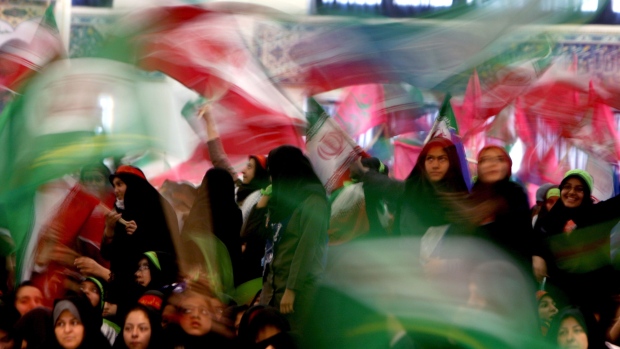Aug 31, 2020
Iran Crisis Countdown Hits Pause as Diplomacy Kicks Into Gear
, Bloomberg News

(Bloomberg) -- With U.S. elections just two months away, China, Europe and Russia will play for time in an attempt to prevent the Trump administration’s maximum-pressure campaign on Iran from descending into even deeper conflict.
The commission responsible for resolving disputes under the Iran nuclear deal is returning Tuesday to the Vienna palace where the landmark agreement, known as the Joint Comprehensive Plan of Action, was sealed five years ago. It’s the first meeting of envoys from signatory states since the United Nations Security Council rejected U.S. attempts to restore international sanctions, and follows new impetus to widen nuclear inspections inside the Persian Gulf country.
Trump’s Iran Move at UN Amplifies ‘America First’ Snub of Allies
“The Joint Commission members who remain will try to navigate this as best they can with everyone waiting until Nov. 3,” Wendy Sherman, one of the architects of the accord, said in an interview. Though American diplomats won’t be present when officials convene at the Palais Coburg -- Washington pulled out of the deal in 2018 -- the U.S. presidential election just 63 days away will weigh heavily on their decisions, she said.
China, France, Germany, Iran, Russia and the U.K. still want to keep the 2015 accord, which was supposed to cap Tehran’s nuclear activities in exchange for sanctions relief. President Donald Trump’s decision to quit the pact and reimpose U.S. sanctions threatened to scuttle the agreement. Iran responded by violating limits on the amount of nuclear fuel it’s allowed to produce under the deal, forcing European participants to contain repercussions by triggering the agreement’s so-called Dispute Resolution Mechanism.
Tuesday’s meeting is a follow-up to that move.
Iran’s Deputy Foreign Minister Abbas Araghchi arrived in the Austrian capital on Monday for talks with International Atomic Energy Agency Directory General Rafael Mariano Grossi, according to state-run Islamic Republic News Agency. Iran agreed last week to allow international monitors to visit two sites that may have hosted atomic work two decades ago. Russia’s IAEA envoy Mikhail Ulyanov said Joint Commission members will have “a lot of topics to discuss,” according to a post on Twitter.
Iran Ends Tussle With Nuclear Inspectors by Opening Two Sites
“The tension had been building over the summer but they’re now in a better position than they were two months ago to buy some more time,” said Gaukhar Mukhatzhanova, a director at the Vienna Center for Disarmament and Non-Proliferation, who advises diplomats on policy. Pressure in the Gulf has risen over the last year as tit-for-tat ship seizures and facility attacks have threatened to spill into open military conflict.
The middle way that European countries have been trying to adhere to has become increasingly difficult, according to two of the bloc’s officials who asked not to be identified. The European Union wants to maintain the nuclear deal while continuing to deny Iran access to conventional weapons. It’s increasingly focused on the U.S. election calendar and the possibility that a Democratic victory in November could revive what’s left of the multilateral accord.
“It is quite amazing that the JCPOA, even if just hanging by a thread, is still in existence,” said Sherman in an interview from Harvard University in Cambridge, Massachusetts, where she now lectures. “We thought that the JCPOA could have this kind of durability but I don’t think anyone quite knew.”
©2020 Bloomberg L.P.


